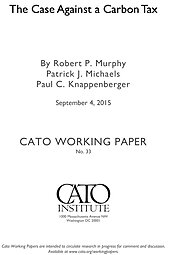A vigorous campaign aimed at American policymakers and the general public has tried to create the perception that a federal carbon tax (or similar type of “carbon price”) is a crucial element in the urgently needed response to climate change. Within conservative and libertarian circles, a small but vocal group of academics, analysts, and political officials are claiming that a revenue-neutral carbon tax swap could even deliver a “double dividend” — meaning that the conventional economy would be spurred in addition to any climate benefits. The present study details several serious problems with these claims. The actual economics of climate change — as summarized in the peer-reviewed literature as well as the U.N. and Obama Administration reports — reveal that the case for a U.S. carbon tax is weaker than the public has been told.
In the policy debate over carbon taxes, a key concept is the “social cost of carbon,” which is defined as the (present value of) future damages caused by emitting an additional ton of carbon dioxide. Estimates of the SCC are already being used to evaluate federal regulations, and will serve as the basis for any U.S. carbon tax. Yet the computer simulations used to generate SCC estimates are largely arbitrary, with plausible adjustments in parameters — such as the discount rate — causing the estimate to shift by at least an order of magnitude. Indeed, MIT economist Robert Pindyck considers the whole process so fraught with unwarranted precision that he has called such computer simulations “close to useless” for guiding policy.
Future economic damages from carbon dioxide emissions can only be estimated in conjunction with forecasts of climate change. But recent history shows those forecasts are in flux, with an increasing number of forecasts of less warming appearing in the scientific literature in the last four years. Additionally, we show some rather stark evidence that the family of models used by the U.N.’s Intergovernmental Panel on Climate Change (IPCC) are experiencing a profound failure that greatly reduces their forecast utility.
Ironically, the latest U.N. Intergovernmental Panel on Climate Change (IPCC) report indicated that a popular climate target cannot be justified in cost/benefit terms. Specifically, in the middle-of-the-road scenarios, the economic compliance costs of limiting global warming to 2 degrees Celsius would likely be higher than the climate change damages that such a cap would avoid. In other words, the U.N.’s own report shows that aggressive emission cutbacks — even if achieved through an “efficient” carbon tax — would probably cause more harm than good.
If the case for emission cutbacks is weaker than the public has been led to believe, the claim of a “double dividend” is on even shakier ground. There really is a “consensus” in this literature, and it is that carbon taxes cause more economic damage than generic taxes on labor or capital, so that in general even a revenueneutral carbon tax swap will probably reduce conventional GDP growth. (The driver of this result is that carbon taxes fall on narrower segments of the economy, and thus to raise a given amount of revenue require a higher tax rate.) Furthermore, in the real world at least some of the new carbon tax receipts would probably be devoted to higher spending (on “green investments”) and lump-sum transfers to poorer citizens to help offset the impact of higher energy prices. Thus in practice the economic drag of a new carbon tax could be far worse than the idealized revenueneutral simulations depict.
When moving from academic theory to historical experience, we see that carbon taxes have not lived up to the promises of their supporters. In Australia, the carbon tax was quickly removed after the public recoiled against electricity price hikes and a faltering economy. Even in British Columbia — touted as the world’s finest example of a carbon tax — the experience has been underwhelming. After an initial (but temporary) drop, the B.C. carbon tax has not yielded significant reductions in gasoline purchases, and it has arguably reduced the B.C. economy’s performance relative to the rest of Canada.
Both in theory and practice, economic analysis shows that the case for a U.S. carbon tax is weaker than its most vocal supporters have led the public to believe. At the same time, there is mounting evidence in the physical science of climate change to suggest that human emissions of carbon dioxide do not cause as much warming as is assumed in the current suite of official models. Policymakers and the general public must not confuse the confidence of carbon tax proponents with the actual strength of their case.
